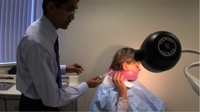Tinnitus in Primary Care course for GPs



This session will describe patient self-management of tinnitus and what you can do to help patients with tinnitus. It will also show how to triage those patients who need to be referred to the first and second levels of care.
Learning Objectives
By the end of this session you will be able to:
- Recognise a patient with tinnitus
- Explain the need for initial counselling and help for patients with tinnitus
- Describe when to refer to audiologists (first level) or to specialist care (second level)
This session will help you to understand the prevalence of tinnitus in the population and differentiate tinnitus from other external and internal sounds.
Before commencing this session you should:
- Know how to perform otoscopy
- Have completed the session: AUD_3_01_02 Methods of Wax Removal
- Communication Impairments Part 4: Autistic Spectru...
- Posted By eIntegrity Healthcare e-Learning
- Posted Date: 2024-12-23
- Location:Online
- This session is the last of four that looks at different speech, language and communication impairme...
- Communication Impairments Part 3: Cleft Palate, He...
- Posted By eIntegrity Healthcare e-Learning
- Posted Date: 2024-12-23
- Location:Online
- This session is the third of four which describe different speech, language and communication impair...
- Communication Impairments Part 2: Specific Speech ...
- Posted By eIntegrity Healthcare e-Learning
- Posted Date: 2024-12-23
- Location:Online
- This session is about speech sound disorder (SSD). It describes the characteristics associated with ...
- Communication Impairments Part 1: Late-talking Tod...
- Posted By eIntegrity Healthcare e-Learning
- Posted Date: 2024-12-23
- Location:Online
- This session is the first of four which describe different speech, language and communication impair...
- Typical Development Part 2: First Words and Early ...
- Posted By eIntegrity Healthcare e-Learning
- Posted Date: 2024-12-23
- Location:Online
- This session gives an overview of the main aspects of how language typically develops in children. I...







